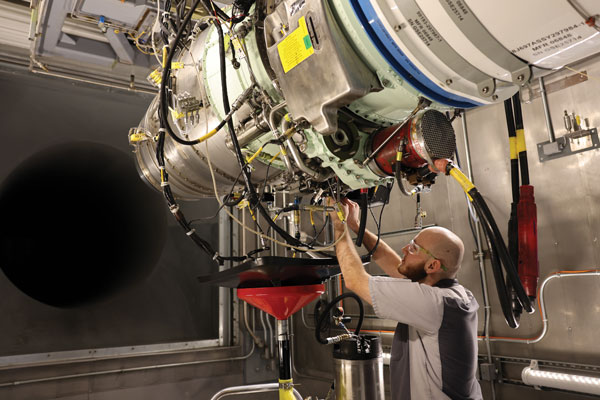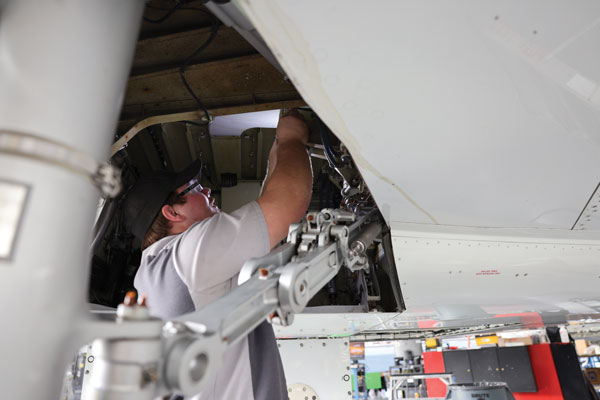
Jarrek Renshaw
The senior year of high school is something all kids look forward to. Playing varsity sports, singing in the choir, marching in the band, sitting on the student council…and it all culminates when you receive your high school diploma and celebrate with family, friends, and those that matter most.
Things then change drastically as these young adults take very different paths. Some seem to have it all figured out, which is great. Others wonder what they may be good at doing or what they’re passionate about, which is also great. If you’ve ever had a passion for aviation or a talent for mechanics then Duncan Aviation has a unique post-high school option you might consider: an Airframe and Engine Apprenticeship Program.
Duncan Aviation’s Apprenticeship Program provides on-the-job training and instruction to qualified airframe and engine technician candidates. Those accepted into the program assist Duncan Aviation technicians with daily technical tasks while gaining the knowledge and experience necessary to earn the FAA Airframe Technician and/or Engine Technician certificate. Through daily exposure on the job, supplemental training in the classroom, and practical application in a mechanic’s lab, apprentices follow a standardized pathway that will ensure they develop into well-rounded and competent airframe and engine maintenance technicians. Technicians must learn flight theory, aircraft structural make-up and repair, aircraft systems design, operation and repair, aircraft inspections, and regulations, privileges and paperwork required for aircraft maintenance.
The program is registered with the US Department of Labor and is available at Duncan Aviation’s full-service maintenance facilities in Battle Creek, Michigan; Lincoln, Nebraska; and Provo, Utah.
Jeremy Rangel, Duncan Aviation Airframe Manager, says, “The work-based learning strategy helps Duncan Aviation increase team member skills and engagement while developing the company’s future leaders.”
Currently, Duncan Aviation has 35 team members in the program learning and working full-time. In addition to the time spent learning on the job, they will need to study during their own time to ensure they understand the concepts they are taught. They have up to 24 months from joining the program to earn their certificate. They are then asked to remain with Duncan Aviation for an additional 12 months.

Nathan Roth
Jarrek Renshaw is currently working at our Lincoln, Nebraska, facility in Turbine Engine Services, and is working towards his Powerplant license.
“I decided to get my Powerplant license because my father has his and told me about all the opportunities that having my license will allow, such as moving up in the company,” Jarrek said. “Participating in this program will allow me to become a QI (Qualified Inspector) at the very least, and will open the door to me becoming a Tech III or Lead Tech, and hopefully, a Team Leader.”
Jarrek said the best part about the program is that he is learning a lot about the other side of aviation, as he deals mostly with turbine engines currently and the class covers a lot of the airframe items that he will need to know.
Nathan Roth started as an Airframe Tech Helper in 2019. He always had intentions of getting his A&P, but was encouraged from the very beginning to start pursuing it through the Apprenticeship Program once his first 90 days of employment were up. He completed the program and earned his A&P in July 2021 and has already progressed to an Airframe Tech III.
The program was very flexible with classroom work once a week. The program cost me nothing and I was paid while I was gaining on the job experience. I would consider every person on my team to be a mentor. They’ve all taught me along my way. And someday I would like to earn a position as an Airframe Team Leader.
My advice, “Do it, and start studying right away. It’s totally worth the effort.”